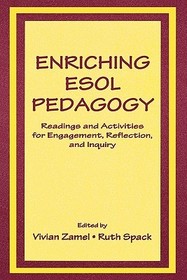
Enriching Esol Pedagogy
Readings and Activities for Engagement, Reflection, and Inquiry
-
20% KEDVEZMÉNY?
- A kedvezmény csak az 'Értesítés a kedvenc témákról' hírlevelünk címzettjeinek rendeléseire érvényes.
- Kiadói listaár GBP 69.99
-
33 437 Ft (31 845 Ft + 5% áfa)
Az ár azért becsült, mert a rendelés pillanatában nem lehet pontosan tudni, hogy a beérkezéskor milyen lesz a forint árfolyama az adott termék eredeti devizájához képest. Ha a forint romlana, kissé többet, ha javulna, kissé kevesebbet kell majd fizetnie.
- Kedvezmény(ek) 20% (cc. 6 687 Ft off)
- Kedvezményes ár 26 750 Ft (25 476 Ft + 5% áfa)
Iratkozzon fel most és részesüljön kedvezőbb árainkból!
Feliratkozom
33 437 Ft

Beszerezhetőség
Becsült beszerzési idő: A Prosperónál jelenleg nincsen raktáron, de a kiadónál igen. Beszerzés kb. 3-5 hét..
A Prosperónál jelenleg nincsen raktáron.
Why don't you give exact delivery time?
A beszerzés időigényét az eddigi tapasztalatokra alapozva adjuk meg. Azért becsült, mert a terméket külföldről hozzuk be, így a kiadó kiszolgálásának pillanatnyi gyorsaságától is függ. A megadottnál gyorsabb és lassabb szállítás is elképzelhető, de mindent megteszünk, hogy Ön a lehető leghamarabb jusson hozzá a termékhez.
A termék adatai:
- Kiadás sorszáma 1
- Kiadó Routledge
- Megjelenés dátuma 2002. július 1.
- ISBN 9780805839395
- Kötéstípus Puhakötés
- Terjedelem472 oldal
- Méret 229x152 mm
- Súly 880 g
- Nyelv angol 0
Kategóriák
Rövid leírás:
Provides a theoretical perspective and offers ways for making the teaching of English to speakers of other languages meaningful for both teachers and learners. Textbook for second-language methodology courses.
Hosszú leírás:
Enriching ESOL Pedagogy: Readings and Activities for Engagement, Reflection, and Inquiry is a collection of thought-provoking articles and activities designed to engage practicing and prospective ESOL teachers in an ongoing process of reflecting on, critically examining, and investigating theory and practice. Its twofold purpose is to provide a theoretical perspective and to offer ways for making the teaching of English to speakers of other languages (ESOL) meaningful for both teachers and learners. Underlying the activities and the readings themselves is the assumption that teachers need to play a role in exploring, shaping, and theorizing the work they do.
The readings included represent a range of genres. They are informed by a common philosophical perspective about language acquisition and treat language teaching and learning holistically. The book is organized into five integrated units that:
* raise questions about conventional notions of methods;
* take into account the complicated nature of real classrooms;
* provide theoretical principles for teaching that promotes language acquisition;
* include rich descriptions of actual classroom experiences; and
* question assumptions about language and literacy.
Each set of readings begin with a "Before Reading" section and is followed by "Reflecting on the Readings," "Reading for Further Reflection," and "Suggested Projects for Inquiry" sections.
This volume is a valuable resource for practicing and prospective teachers in the field of TESOL who work with diverse student populations--at all levels--in both mainstream and ESL/bilingual settings.
"this anthology has two major strengths: (a) the essays in the collection are well-written and well-documented articles, mainly by leading specialists in ESOL research and pedagogy; and (b) the reflection and inquiry activities designed by the editors stimulate introspection, application, and extension of the ideas presented in each section of the book."
&&&8212;The Modern Language Journal
"...this is a book that ESOL methods teachers and students should find very useful in grappling with some of the more salient issues in the field."
&&&8212;Studies in Second Language Acquisition
"I am very enthusiastic about this book. It will provide a much-needed resource for the field."
&&&8212;Judith Rodby
California State University, Chico
"Zamel and Spack have set out to rectify a major problem with second language and literacy teacher training, and that is its lack of intellectual depth, a lack stemming from a historical focus on classroom practice as separated from theory-making....By asking faculty/teachers-in-training to think about others' ideas and experience and their own, to observe and reflect, to work on making sense of what they know, and to connect and integrate in order to create their own learning, they are bringing second-language training into social theory and vice versa....This book has the potential for affecting significant change."
&&&8212;Linda Lonon Blanton
University of New Orleans
Tartalomjegyzék:
Contents: Preface. Introduction. Part I: Questioning the Nature of Methods. M.A. Clarke, S. Silberstein, Problems, Prescriptions, and Paradoxes in Second Language Teaching. A. Holliday, Teachers' and Students' Lessons. C.M. Roller, Classroom Interaction Patterns: Reflections of a Stratified Society. A. Pennycook, The Concept of Method, Interested Knowledge, and the Politics of Language Teaching. Part II: Seeing the Classroom. J.F. Fanselow, Let's See: Contrasting Conversations About Teaching. K.M. Losey, Gender and Ethnicity as Factors in the Development of Verbal Skills in Bilingual Mexican American Women. L. Harklau, ESL Versus Mainstream Classes: Contrasting L2 Learning Environments. G. Hull, M. Rose, K.L. Fraser, M. Castellano, Remediation as Social Construct: Perspectives From an Analysis of Classroom Discourse. C. Genishi, Observing the Second Language Learner: An Example of Teachers' Learning. Part III: Theories Into Practice: Promoting Language Acquisition. S. Krashen, Theory Versus Practice in Language Training. K. Krahnke, M.A. Christison, Recent Language Research and Some Language Teaching Principles. M.A. Clarke, On the Nature of Technique: What Do We Owe the Gurus? E.R. Auerbach, What Is a Participatory Approach to Curriculum Development? Part IV: Theories Into Practice: Keeping Language Meaningful. J.W. Lindfors, The Classroom: A Good Environment for Language Learning. S. Hudelson, Teaching English Through Content-Area Activities. V. Zamel, From the Margins to the Center. K. Boudin, Participatory Literacy Education Behind Bars: AIDS Opens the Door. Part V: Questioning Assumptions About Language and Identity. H.G. Widdowson, The Ownership of English. Y-S.D. Chiang, M. Schmida, Language Identity and Language Ownership: Linguistic Conflicts of First-Year University Writing Students. S. Vandrick, ESL and the Colonial Legacy: A Teacher Faces Her 'Missionary Kid' Past. S.J. Ortiz, The Language We Know. A. Tan, Mother Tongue.
Több



